高级翻译调查问卷
- 格式:doc
- 大小:15.00 KB
- 文档页数:2
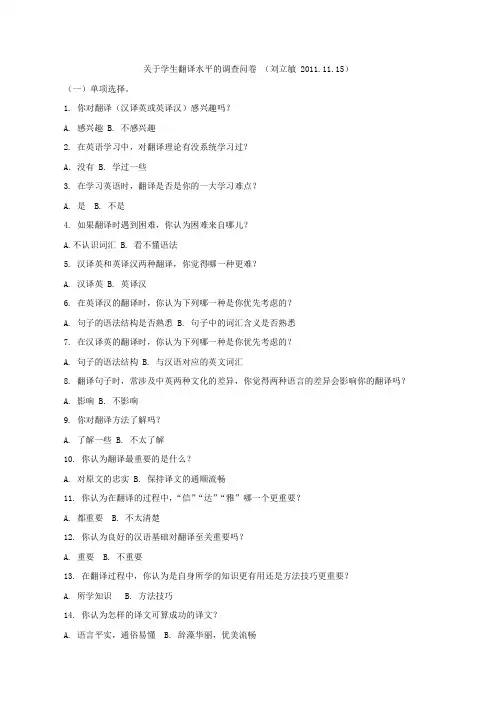
关于学生翻译水平的调查问卷(刘立敏 2011.11.15)(一)单项选择。
1. 你对翻译(汉译英或英译汉)感兴趣吗?A. 感兴趣B. 不感兴趣2. 在英语学习中,对翻译理论有没系统学习过?A.没有 B. 学过一些3. 在学习英语时,翻译是否是你的一大学习难点?A. 是B. 不是4. 如果翻译时遇到困难,你认为困难来自哪儿?A.不认识词汇B. 看不懂语法5. 汉译英和英译汉两种翻译,你觉得哪一种更难?A. 汉译英B. 英译汉6. 在英译汉的翻译时,你认为下列哪一种是你优先考虑的?A. 句子的语法结构是否熟悉B. 句子中的词汇含义是否熟悉7. 在汉译英的翻译时,你认为下列哪一种是你优先考虑的?A. 句子的语法结构B. 与汉语对应的英文词汇8. 翻译句子时,常涉及中英两种文化的差异,你觉得两种语言的差异会影响你的翻译吗?A. 影响B. 不影响9. 你对翻译方法了解吗?A. 了解一些B. 不太了解10. 你认为翻译最重要的是什么?A. 对原文的忠实B. 保持译文的通顺流畅11. 你认为在翻译的过程中,“信”“达”“雅”哪一个更重要?A. 都重要B. 不太清楚12. 你认为良好的汉语基础对翻译至关重要吗?A. 重要B. 不重要13. 在翻译过程中,你认为是自身所学的知识更有用还是方法技巧更重要?A. 所学知识B. 方法技巧14. 你认为怎样的译文可算成功的译文?A. 语言平实,通俗易懂B. 辞藻华丽,优美流畅15. 翻译完成后您会经常进行检查核对吗?A. 经常B. 很少16. 你觉得学习翻译会对考试有帮助吗?A. 有B. 没有17. 你觉得学好翻译会不会有助于提高你的口语交际能力?A. 会B. 不会18. 对中国优秀作品的英译本,比如《红楼梦》和《水浒》,你有没有读过?A. 有B. 没有19. 有没有读过英文小说的中文版,比如《双城记》,《简爱》等等?A. 有B. 没有20. 如果学校举办翻译方面的比赛,你会参加吗?A. 会B. 不会(二)多项选择。
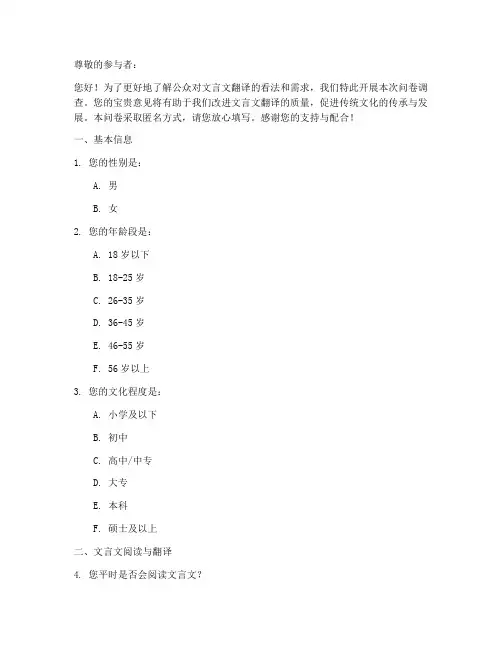
尊敬的参与者:您好!为了更好地了解公众对文言文翻译的看法和需求,我们特此开展本次问卷调查。
您的宝贵意见将有助于我们改进文言文翻译的质量,促进传统文化的传承与发展。
本问卷采取匿名方式,请您放心填写。
感谢您的支持与配合!一、基本信息1. 您的性别是:A. 男B. 女2. 您的年龄段是:A. 18岁以下B. 18-25岁C. 26-35岁D. 36-45岁E. 46-55岁F. 56岁以上3. 您的文化程度是:A. 小学及以下B. 初中C. 高中/中专D. 大专E. 本科F. 硕士及以上二、文言文阅读与翻译4. 您平时是否会阅读文言文?B. 偶尔阅读C. 很少阅读D. 从不阅读5. 您认为以下哪种翻译方式更易于理解文言文?A. 直译B. 意译C. 直译与意译相结合D. 其他(请说明)6. 您认为以下哪种翻译风格更符合文言文的韵味?A. 简洁明快B. 娓娓道来C. 严谨规范D. 其他(请说明)7. 您在阅读文言文时,遇到以下哪种情况较多?A. 不懂字词B. 不懂语法C. 不懂文化背景D. 不懂翻译技巧E. 以上都是8. 您认为以下哪种翻译工具对您帮助最大?A. 纸质词典B. 在线词典D. 翻译软件E. 其他(请说明)三、文言文翻译需求9. 您认为以下哪种翻译类型对您最有价值?A. 文言文原文翻译B. 文言文选段翻译C. 文言文经典作品翻译D. 文言文现代作品翻译E. 其他(请说明)10. 您对文言文翻译有哪些具体需求?A. 译文准确、易懂B. 译文保持文言文的韵味C. 译文包含丰富的文化背景D. 译文提供详细的注释E. 其他(请说明)11. 您认为以下哪种翻译质量最满意?A. 译文准确、通顺B. 译文简洁、明了C. 译文具有艺术性D. 译文具有较高的学术价值E. 其他(请说明)四、其他建议12. 您对文言文翻译有何建议?A. (请说明)13. 您认为如何提高文言文翻译的质量?A. (请说明)再次感谢您参与本次调查问卷,您的宝贵意见将对我们产生重要影响。
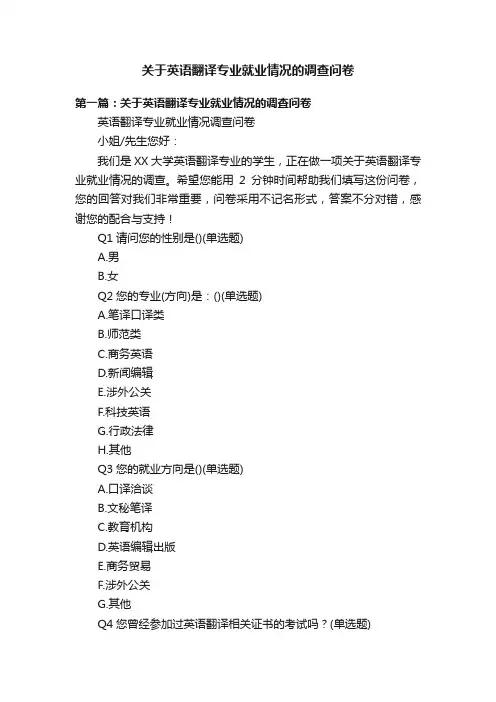
关于英语翻译专业就业情况的调查问卷第一篇:关于英语翻译专业就业情况的调查问卷英语翻译专业就业情况调查问卷小姐/先生您好:我们是XX大学英语翻译专业的学生,正在做一项关于英语翻译专业就业情况的调查。
希望您能用2分钟时间帮助我们填写这份问卷,您的回答对我们非常重要,问卷采用不记名形式,答案不分对错,感谢您的配合与支持!Q1请问您的性别是()(单选题)A.男B.女Q2您的专业(方向)是:()(单选题)A.笔译口译类B.师范类C.商务英语D.新闻编辑E.涉外公关F.科技英语G.行政法律H.其他Q3您的就业方向是()(单选题)A.口译洽谈B.文秘笔译C.教育机构D.英语编辑出版E.商务贸易F.涉外公关G.其他Q4您曾经参加过英语翻译相关证书的考试吗?(单选题)B.否Q5您对这些证书的认识有多少?(单选题)A.非常了解B.基本了解C.说不清D.很少了解E.不了解Q6参加相关证书的考试您的成绩一般是()(单选题)A.优秀B.及格C.不及格Q7您认为当今市场的需求和就业现状对哪些证书的认可度比较高()(多选题)更多问卷模板请上问卷网A.全国翻译专业资格(水平)证书B.全国外语翻译证书考试C.笔译中高级证书D.全国商务英语翻译资格证书E.口译证书F.欧盟同声传译证书G.商务英语中高级证书H.英语专业四、八级证书I.其他__________________________Q8您选择英语翻译专业的动机是什么()(单选题)A.自己的兴趣B.父母的要求C.老师的推荐D.就业前景好E.被分配Q9您在校时,平时每天会投入到多少时间在本专业上()(单选题)A.10小时以上B.5-10小时C.5小时以下D.几乎没有Q10目前您所掌握的英语翻译专业技能是否达到了期望值?你能很好地把专业知识运用到您所处的职业(岗位)中吗?(单选题)A.完全达到(可以)B.基本达到(可以)C.一般D.基本达不到(不可以)E.完全达不到(不可以)Q11您认为英语翻译专业最看重人才的什么能力?(可多选)()(多选题)A.专业知识的掌握B.人际交往能力C.灵敏的应变能力D.对数字的敏感度E.空间想象力F.创新能力G.敏锐的洞察力H.行动力I.其他Q12对正在学英语专业翻译的学生有何建议?(填空题)更多问卷模板请上问卷网第二篇:英语翻译专业就业方向及职业发展调查英语翻译专业就业方向及前景的调查分析调查时间:2012年国庆假期调查地点:中铁十一局电务工程有限公司英语作为现今世界上最通用的语言,无论是从经济全球化的世界局势来看,还是从中国与国际接轨的发展路子来看,英语在中国地位都越来越高,也有越来越多的中国人学讲英语,会讲英文。

翻译(英语方向)专业调查问卷1、您的性别是?【单选题】○ 男○ 女2、您身边从事或学习翻译专业的人员多吗?【单选题】○ 多○ 不多○ 一般3、您看好翻译专业的发展前景吗?【单选题】○ 是○ 否4、您认为翻译专业口译与笔译哪一项更重要?【单选题】○ 口译○ 笔译5、您认为是工作能力更重要还是工作态度更重要?【单选题】○ 工作能力○ 工作态度6、您曾参加过翻译专业的证书考试吗?【单选题】○ 是○ 否7、您认为翻译人员的受教育程度重要吗?【单选题】○ 相当重要○ 重要○ 不重要8、您认为翻译专业人员的教育背景重要吗?【单选题】○ 重要○ 不重要○ 一般9、您认为翻译专业的人员的形象重要吗?【单选题】○ 非常重要○ 重要○ 不重要○ 一般10、您认为翻译专业的学生就业形势是否乐观?【单选题】○ 非常乐观○ 乐观○ 不乐观○ 一般11、您认为翻译专业的学习难度如何?【单选题】○ 非常困难○ 比较困难○ 一般○ 不困难12、您认为翻译人员是否应该拥有各项证书?【单选题】○ 是○ 否13、您认为翻译专业的学生是否应该留学?【单选题】○ 是○ 否14、您认为翻译专业的人员应具备哪些素质?【多选题】□ 受教育程度□ 翻译技巧与速度□ 翻译实践经验□ 工作态度15、您认为翻译专业应加强哪些方面的专业课程设置?【多选题】□ 英汉语言的能力培养□ 专业化翻译培训□ 增加社会时间经验□ 培养翻译技巧与方法16、您认为翻译(英语专业)应从事哪些行业?【多选题】□ 口译员□ 笔译员□ 英语教师□ 外交人员□ 导游□ 白领17、与其他专业相比,翻页专业具有哪些优势?【多选题】□ 具有雄厚的翻译基础□ 翻译社会实践经验丰富□ 具有较高的素质与学历□ 掌握翻译技巧与英语方法18、您认为翻译专业在哪些方面具有优势?【多选题】□ 高薪就职□ 能力较高□ 接触面广□ 发展行业丰富19、您认为翻译人员应具备哪些证书?【多选题】□ 口译等级证书□ 笔译等级证书□ 英语专业专四,专八证书20、您对翻译专业人员的培养具有哪些建议?【填空题】________________________。

翻译调查问卷(总14页)--本页仅作为文档封面,使用时请直接删除即可----内页可以根据需求调整合适字体及大小--Dear ladies and gentlemen:We are the researchers who work at Criminal Law Research Institute of Beijing Normal University. Recently, we are studying that foreigners commit crimes in China. The aim of this study is to learn the basic state of foreigners committing crimes in China, particularly the reason of crime, to find some approaches to avoiding crime through improving the foreigners’ living and working condition. We hope to help foreigners to fuse into Chinese social life.Perhaps your answers only reflect your own situation, but more mad more answers could form a big social problem that every person has to deal with. Therefore, your real encounter and feelings is important not only for the research, improving the foreigners’ livi ng and working condition, even for the development of Chinese society and the progress of the legal system.The information that we obtain from this research is only used to do the legal study. This research conducted secretly so that your identity and answers will not be showed to anyone. Your answer will not exact the negative effect on you, so when you answer these questions you can relax yourself.We are grateful for your participation and cooperation for this research.Criminal Law Research Institute of Beijing Normal UniversityMarch, 2014Instructionsmark the “√”,if your situation is meet the option. You can choose not only one option. Some questions need your further explanation, please fill up with your true feelings.2. No matter what your answer is, it will not have any negative effect on you, your family, your friends and others.3. Please complete this questionnaire independently. Don’t discuss with others.4. If you have other views on this research or need consultation and help in legal problems, please write it down or contact us directly.EmailContact person: Lirong GuoNumber:010-;Mailling address: Criminal Law Research Institute of Beijing Normal University, 19 Xinjiekouwai Street, BeijingPostcode: 100875The questionnaire on foreigners committing crimes in China1.What is your gender?2.3.A.MaleB. Female4.What is your age?5.What is your nationality6.What is your education level?7.8.A.Never go to schoolB.Primary schoolC.Middle schoolD.High school or vocational schoolE.University degree or above9.What is your Chinese level?10.11.A.Excellent, no language barrierB.No problem in daily conversationC.You only can say some simple greetings.D.You hardly speak Chinese12.W hat is your job in your own country before you come to China?13.14.A.StudentB.Work in a company, white collarC.Run some small business, ordinary workerD.JoblessE.Others15.When did you come to China?16.W hy do you come to China?17.18.A.TravelB.WorkC.ReadingD.Do business (hope to make a lot of money)E.Visit relatives and friendsF.Others19.W hat is your basic situation in China before you are sent to prison?20.21.A.Study in schoolB.Work in a company, white collarC.Run some small business, ordinary workerD.JoblessE.Others10. Why are you sent to prison?A. theftB. robC. lootD. fraudE. extortionF. rapeG. intentional injuryH. smuggleI. intentional homicideJ. vending narcotic drugs K. others11. How long are you sentenced to in prisonYear/s month/s12. When do you commit your crime?A. The first year when you come to ChinaB. The second year when you come to ChinaC. The third year when you come to ChinaD. after five years when you come to ChinaE. others:13. Did you commit your crime aloneA. yes, I committed the crime on my ownB. no, other people participated in crimeTips: If you choose A, please answer 18th question directly; if you choose B, answer the next question.14. How many people participated in crime including you15. Did Chinese participate in crime A. yes B. No16. When you are committing crime who is your leader?A. meB. ChineseC. people who are hardened and professionalD. no leader, we discuss together17. Why do you commit crime with ChineseA. I could not complete the crime on my ownB. Chinese wanted to use my foreign identity provides convenience for committing crime.C. Chinese know more about Chinese situation, I want to use him.D. we happened to commit crime together18. Some options that about the victim (you can choose not only one option)A. no victim or you do not know the situation of the victimB. the victim is a juvenileC. the victim is an adultD. the victim is an old personE. the victim is femaleF. the victim is ChineseG. the victim is not ChineseH. you know the victim (your friends, neighbor, or others)I. the victim is a stranger19. What is your understanding of your crime before you take action?A. you know this action will violate the criminal law in China, but you think that you will not be caughtB. you know this action will violate the criminal law in China, but you think that you are a foreigner; even if you are caught, you will not be punishedC. you do not know this action will violate the criminal law, but you think it is illegalD. you think your action is legal; it will not incur adverse consequences20. Your crime that commit in China:A. it also violate the law in your own countryB. it do not violate the law in your own countryC. you do not know whether it is a crime in your own country21. Why you commit crime in China? (you can choose not only one option)A. you do not have money; your life is difficultB. you need some money to squanderC. seek thrillD. sexual satisfactionE. suffers wrong; want to ventF. aggressive, want to oppress othersG. chivalrous person, like to help friendsH. others22. When are you caught by the police after you commit crime?A. arrested on spotB. within a dayC. within a weekD. within a monthE. within six monthsF. within a yearG. more than a year23. During the trial process, do you hire a lawyer?A. my family or I hire a lawyer for meB. I do not hire any lawyer, the court appoint lawyer for meC. I do not hire any lawyer and the court does not appoint lawyer for me24. During the trail process, did any translator provide service for you?A. Yes, translator provides service for meB. no translator but I can understand ChineseC. I could not understand Chinese and there is no translator providing service for me.25. How many times did you commit crime in China?A. onceB. more than onceC. many times (more than three times)26. Have you ever committed crime in your own country or other countries before you come to China?A. noB. yes, I have. I commit27. What is your age when you first committed crime?years old.28. If when you are going to commit crime (you have already come to the crime scene or you are on the way to the crime scene) but you encounter police on patrol, how do you behave in such situation?A. only if you will not be caught, you will continue to commit crimeB. depends on the situation; if the action is not detected, you will continue to commit crimeC. scared; you abandon your crime act29. If you find that there are some monitor devices in your guilty place, how do you behave?A. abandons your crime actB. try to avoid these monitor devices and continue to commit crimeC. ignores these devices, continue to commit crime30. Compared with your own country or other countries where you have been there, what is your opinion on Chinese public security?A. excellent feels safeB. just so so;C. less goodD. bad, you do not have a sense of safety31. Except your crime which was accused, do you have illegal entry, illegal residence or illegal employment?A. noB. yes, you have been detected by policeC. yes, you have but you are not detected by policeTips: If you choose A, please answer the 34th question directly; if you choose B, please answer the next question; if you choose C, please answer the 33 question.32. If the police detect your illegal entry, illegal residence, or illegal employment, how do they deal with?A. they do not give any punishmentB. fineC. detentionD. instruct me to leave China within the deadline33. Before you are detected by police, how long did you illegal entry, illegal residence or illegal employment last?A. no more than three monthsB. 3~6 monthsC. more than 6 months less than 1 yearD. more than 1year34. What is the relationship between you and your neighbors?A. you do not know each otherB. you know few of them and chat with themC. you know most of them and you are friends35. Have you ever taken part in any community events (New Year celebrations)A. yes, I have.B. no, I have not.36. Do you know about Chinese law?A. not at allB. a littleC. a lot37. How do you learn about Chinese law?A. reading books or consulting the codeB. you watch some TV program, like Today’s Law or othersC. the lawyer or the legal counsel who are work in my company tell meD. the laws education activity in our communityE. others38. Compared with other countries where you have lived in, do you think that it is very difficult to integrate into Chinese society?A. more difficult than other countries where I have lived inB. easier than other countriesC. no big difference39. What is the most difficult problem to you to live in ChinaA. languageB. foodC. working environmentD. interpersonal communicationE. uncivilized act of strangersF. the hidden rules that prevail in societyG. others40. According to your experience of living in China, do you think it is easier or more difficult to deal with some events as a foreigner, compared with Chinese?A. more difficultB. easierC. no big differenceIf you have any suggestions on Chinese law (criminal law, criminal procedure law, exit and entry law), please write it down:。
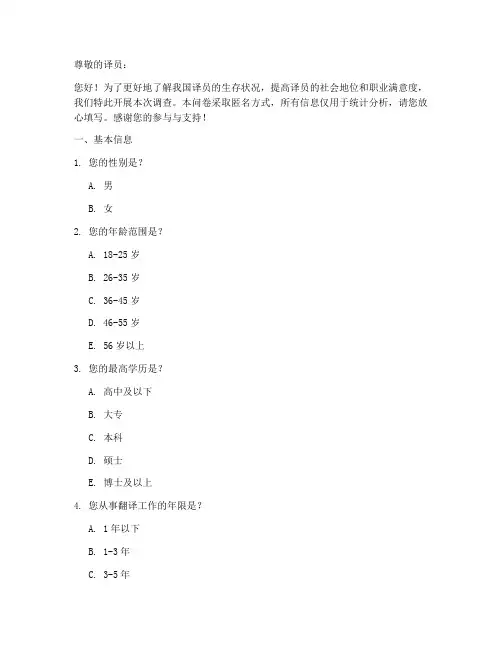
尊敬的译员:您好!为了更好地了解我国译员的生存状况,提高译员的社会地位和职业满意度,我们特此开展本次调查。
本问卷采取匿名方式,所有信息仅用于统计分析,请您放心填写。
感谢您的参与与支持!一、基本信息1. 您的性别是?A. 男B. 女2. 您的年龄范围是?A. 18-25岁B. 26-35岁C. 36-45岁D. 46-55岁E. 56岁以上3. 您的最高学历是?A. 高中及以下B. 大专C. 本科D. 硕士E. 博士及以上4. 您从事翻译工作的年限是?A. 1年以下B. 1-3年C. 3-5年D. 5-10年E. 10年以上二、工作状况5. 您目前的主要工作形式是?A. 自由职业B. 在职翻译C. 翻译公司员工D. 其他6. 您主要从事哪种类型的翻译工作?A. 文学翻译B. 商务翻译C. 技术翻译D. 法律翻译E. 其他7. 您每月平均翻译字数是多少?A. 10000字以下B. 10001-20000字C. 20001-30000字D. 30001-50000字E. 50000字以上8. 您每月的平均收入是多少?A. 5000元以下B. 5001-10000元C. 10001-20000元D. 20001-50000元E. 50000元以上9. 您认为自己的翻译水平如何?A. 优秀B. 良好C. 一般D. 较差E. 非常差10. 您是否接受过专业翻译培训?A. 是B. 否三、职业发展11. 您认为自己的职业发展前景如何?A. 非常好B. 较好C. 一般D. 较差E. 非常差12. 您是否愿意继续从事翻译工作?A. 是B. 否13. 您认为影响您职业发展的主要因素有哪些?(可多选)A. 翻译技能B. 行业经验C. 个人能力D. 社会认可度E. 经济收入F. 其他(请注明)四、生活状况14. 您目前的生活状态如何?A. 满意B. 一般C. 不满意15. 您是否面临较大的生活压力?A. 是B. 否16. 您认为自己的生活质量如何?A. 高B. 一般C. 低17. 您认为自己的健康状况如何?A. 良好B. 一般C. 较差五、其他18. 您对我国翻译行业的现状有何评价?(可多选)A. 发展迅速B. 竞争激烈C. 潜力巨大D. 缺乏规范E. 其他(请注明)19. 您对我国翻译行业的发展有何。
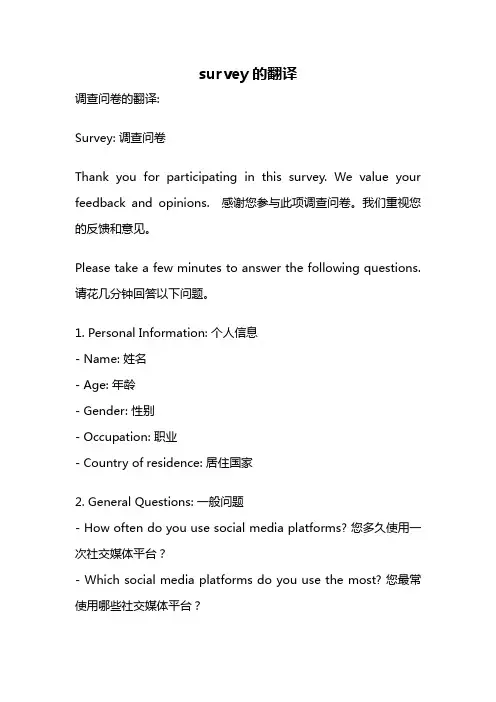
survey的翻译调查问卷的翻译:Survey: 调查问卷Thank you for participating in this survey. We value your feedback and opinions. 感谢您参与此项调查问卷。
我们重视您的反馈和意见。
Please take a few minutes to answer the following questions. 请花几分钟回答以下问题。
1. Personal Information: 个人信息- Name: 姓名- Age: 年龄- Gender: 性别- Occupation: 职业- Country of residence: 居住国家2. General Questions: 一般问题- How often do you use social media platforms? 您多久使用一次社交媒体平台?- Which social media platforms do you use the most? 您最常使用哪些社交媒体平台?- What is the purpose of your social media usage? 您使用社交媒体的目的是什么?- How satisfied are you with the user interface of social media platforms? 您对社交媒体平台的用户界面满意度如何?3. Advertising and Marketing: 广告和营销- How often do you come across sponsored content on social media? 您在社交媒体上多久遇到一次赞助内容?- Do you find sponsored content relevant to your interests? 您认为赞助内容与您的兴趣相关吗?- Have you ever made a purchase based on an advertisement you saw on social media? 您是否曾根据在社交媒体上看到的广告而进行购买?- How likely are you to recommend a product or service to others based on social media advertisements? 基于社交媒体广告,您有多可能向他人推荐产品或服务?4. Privacy and Security: 隐私和安全- How concerned are you about your personal information being shared on social media platforms? 您对个人信息在社交媒体平台上被分享有多担忧?- Have you ever experienced a privacy breach on a social media platform? 您是否曾在社交媒体平台上遇到过隐私泄露?- Do you trust social media platforms to protect your personal data? 您是否相信社交媒体平台能够保护您的个人数据?- What measures do you take to protect your privacy on social media? 您采取哪些措施保护您在社交媒体上的隐私?5. Future Trends: 未来趋势- Do you believe social media will continue to grow in popularity? 您是否认为社交媒体将继续流行?- What new features or improvements would you like to see in social media platforms? 您希望在社交媒体平台中看到哪些新功能或改进?- How do you think social media will evolve in the next five years? 您认为未来五年社交媒体会如何发展?Thank you again for your participation! 感谢您再次参与!。
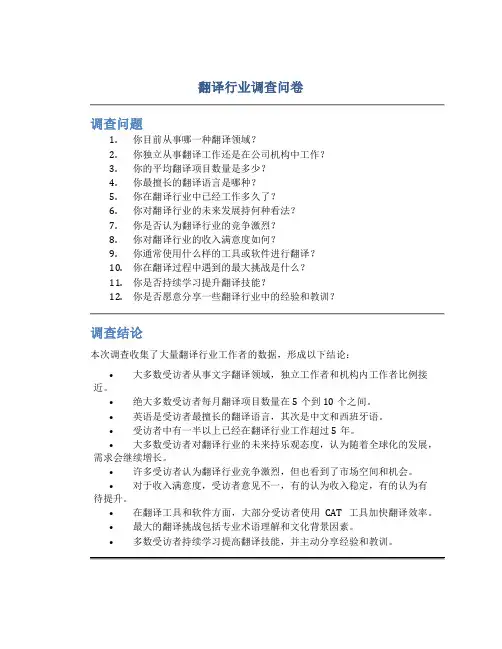
翻译行业调查问卷调查问题1.你目前从事哪一种翻译领域?2.你独立从事翻译工作还是在公司机构中工作?3.你的平均翻译项目数量是多少?4.你最擅长的翻译语言是哪种?5.你在翻译行业中已经工作多久了?6.你对翻译行业的未来发展持何种看法?7.你是否认为翻译行业的竞争激烈?8.你对翻译行业的收入满意度如何?9.你通常使用什么样的工具或软件进行翻译?10.你在翻译过程中遇到的最大挑战是什么?11.你是否持续学习提升翻译技能?12.你是否愿意分享一些翻译行业中的经验和教训?调查结论本次调查收集了大量翻译行业工作者的数据,形成以下结论:•大多数受访者从事文字翻译领域,独立工作者和机构内工作者比例接近。
•绝大多数受访者每月翻译项目数量在5个到10个之间。
•英语是受访者最擅长的翻译语言,其次是中文和西班牙语。
•受访者中有一半以上已经在翻译行业工作超过5年。
•大多数受访者对翻译行业的未来持乐观态度,认为随着全球化的发展,需求会继续增长。
•许多受访者认为翻译行业竞争激烈,但也看到了市场空间和机会。
•对于收入满意度,受访者意见不一,有的认为收入稳定,有的认为有待提升。
•在翻译工具和软件方面,大部分受访者使用CAT工具加快翻译效率。
•最大的翻译挑战包括专业术语理解和文化背景因素。
•多数受访者持续学习提高翻译技能,并主动分享经验和教训。
结语翻译行业作为连接不同语言和文化的桥梁,扮演着重要的角色。
本次调查展现了一部分翻译行业从业者的现状和看法,也为行业发展提供了一定参考。
希望未来能够更加繁荣和专业化,让翻译功底更加扎实,为跨文化交流贡献力量。

翻译调查问卷您好!首先感谢您抽出宝贵时间参加我们的调查问卷工作。
此次问卷主要针对公共场所标语的中英翻译情况,围绕其规范程度以及对城市的影响等几个方面来展开。
请您就您对长沙市英语标识语的印象,记录下您最真实的想法。
———————中南大学外国语学院暑假实践团学校:土木建筑学院:10 年级:本(本/硕/博)性别:男1、您认为有没有必要在公共场所(博物馆、公园、路标、各大商场超市等等)的标识上标注中英双语?(A)A、非常必要B、标不标都可以C、不需要标注2、您平时关注公共场所标识牌的英文翻译吗?(B)A、经常关注B、偶尔关注C、不关注3、您认为当前的标识翻译足够完善么?(B)A、已经很完善了—to---5B、不完善,有待改进和提高---to---44、您认为是什么原因导致标牌翻译不够完善?(D)A、逐字翻译B、拼音和英语混用C、画蛇添足D、不符合表达习惯5、您认为标牌翻译错误的不良影响主要体现在哪方面(B)A、给城市国际形象抹黑B、给外国游客造成不便C、使学生等群体造成误解D、其他6、您是否认为有关部门应该加强管理相关翻译文化?(A)A、非常必要B、管不管都行C、意义不大,没有必要7、您认为哪些措施对于改善公共场所标识牌翻译现状、加强翻译管理切实可行?(B)A、政府相关部分进行整风B、聘请专家翻译并矫正C、提高商家或公共管理部门的内部翻译技能D、公众反馈并加以改正或改善8、您发现过标识牌上的错误吗?(B)A、经常B、偶尔C、几乎没有发现过9、当您看到标识牌翻译错误或不准确到位时会采取何种措施?(B)A、及时向有关负责人员反映并提供参考译文B、自己知道正确翻译即可,不用向有关部门反映C、改不改无所谓,因为很少有人会注意10、您平时生活中发现翻译错误最多的地方是餐馆饭店11、作为大学生,您认为您将会对标识翻译的完善工作做出怎样的贡献?在自己的能力范围内积极指正呼吁更多的人关注标识翻译谢谢您的合作!。
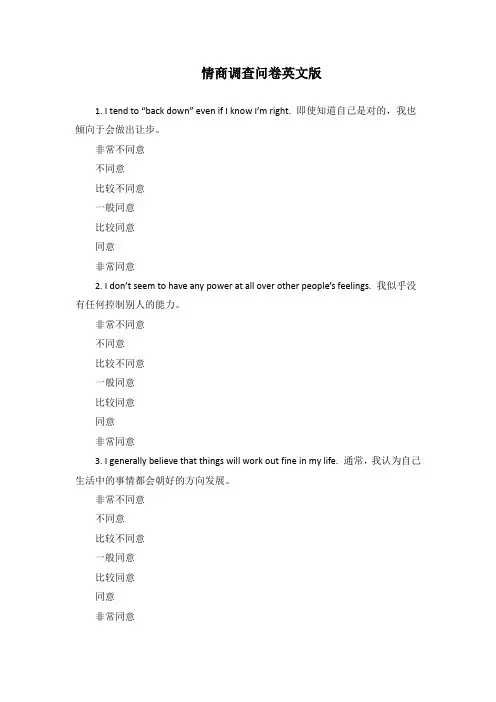
情商调查问卷英文版1. I tend to “back down” even if I know I’m right. 即使知道自己是对的,我也倾向于会做出让步。
非常不同意不同意比较不同意一般同意比较同意同意非常同意2. I don’t seem to have any power at all over other people’s feelings. 我似乎没有任何控制别人的能力。
非常不同意不同意比较不同意一般同意比较同意同意非常同意3. I generally believe that things will work out fine in my life. 通常,我认为自己生活中的事情都会朝好的方向发展。
非常不同意不同意比较不同意一般同意比较同意同意非常同意4. I find it difficult to bond well even with those close to me. 我觉得很难形成亲密的人际关系,即便是最亲近的人也是如此。
非常不同意不同意比较不同意一般同意比较同意同意非常同意5. Generally, I’m able to adapt to new environments. 通常情况下,我能适应新的环境。
非常不同意不同意比较不同意一般同意比较同意同意非常同意6. Others admire me for being relaxed. 别人欣赏我能够放松自己。
非常不同意不同意比较不同意一般同意比较同意同意非常同意7. Expressing my emotions with words is not a problem for me. 对我来说,用语言或文字来表达情绪并不难非常不同意不同意比较不同意一般同意比较同意同意非常同意8. I often find it difficult to see things from another person’s viewpoint. 我常常觉得难以从他人的角度看事物。

新课标下高中生翻译能力问卷调查汇报人:日期:•引言•高中生翻译能力现状•翻译能力的影响因素分析目•提高高中生翻译能力的建议•结论与展望录01引言调查背景和目的随着全球化的加速和国际交流的增多,翻译能力已经成为高中生必备的素养之一。
然而,当前高中生的翻译能力普遍存在不足,需要进一步加强培养和提高。
目的通过问卷调查的方式,了解高中生翻译能力的现状、存在的问题和困难,为教育工作者和相关部门提供参考,促进翻译教学的改进和发展。
采用问卷调查的方法,设计问卷并选取一定数量的高中生进行调查。
问卷包括选择题和开放性问题,涵盖翻译能力的各个方面。
方法调查范围涉及不同地区、不同类型的高中生,包括城市和农村、重点和非重点学校的学生。
同时,为了保证样本的代表性和可靠性,问卷的发放和回收都将严格按照科学的方法进行。
范围调查方法和范围02高中生翻译能力现状根据问卷调查结果,大部分高中生的翻译能力整体水平较低,存在较大的提升空间。
学生在翻译过程中,往往因为词汇量和语法能力的不足而难以准确表达原文意思。
翻译能力整体水平词汇量和语法能力不足整体水平较低高一与高二差异不大问卷调查显示,高一和高二学生的翻译能力差异不明显,但均存在较大的提升空间。
高三学生水平相对较高相比高一和高二学生,高三学生的翻译能力普遍较强,这与他们在学习过程中积累的词汇量和语法能力有关。
不同年级翻译能力对比不同学校类型翻译能力对比生。
普通高中与职业高中差异不明显:问卷调查结果显示,普通高中和职业高中学生在翻译能力上的表现差异不大,但均低于重点高中学生。
综上所述,新课标下高中生翻译能力的现状不容乐观,尤其是在词汇量和语法能力方面存在明显不足。
针对不同年级和学校类型的学生,教育部门和学校应制定有针对性的教学方案,提高学生的翻译能力,促进他们更好地掌握外语知识。
03翻译能力的影响因素分析课堂教学方法是否多样化、互动性强,能否激发学生的学习兴趣和积极性,对提高学生的翻译能力有重要影响。
在华留学生的文化适应及媒体利用情形调查问卷Media Uses and Cultural Adaptation of InternationalStudents in China – Questionnaire您好,我叫__________,是东北财经大学的学生。
为完成一门课程,我需要做一项调查。
我想了解一下您从您的祖国(比如韩国、日本、俄罗斯、坦桑尼亚等)来中国以后,如何利用媒体。
恳请您抽出几分钟时刻完成一份问卷调查。
这次问卷所得的资料纯粹是用于学术目的,绝对没有其他的商业用途。
关于您的帮忙我将不胜感激。
谢谢。
Hello, I am ___________, from Dongbei University of Finance and Economics. I beg you please help me to fill in a questionnaire in order to finish a task for one of my courses. We are interested in your feelings about living in China as well as how you use media here. The data will be used for academic purposes only. Your help means a lot to me. And I really appreciate that. Thank you very much.1. 请问您来自哪个国? Which country are you from?______________________在中国呆了多久了?How long have you been in China?_________Year __________Month2. 请问您来到中国以后看报纸吗?Do you read newspapers in China? (If no, please go to Q 7)(1)YES (2)NO3. 看报纸的时候,您更喜爱看有关哪一方面的信息?When reading newspapers, what kind of information do you like to read?(1)News about China中国本地的消息(2)News about my Motherland关于您自己国家的消息(3)News about both China and my Motherland中国和自己国家的新闻我都看4. Through which way do you read newspapers?(1)在学校图书馆阅读纸质报纸I read newspapers in the library for free (2)自己花钱定阅纸质报纸I read newspapers which I subscribe to (by that I mean, I have to pay certain amount of money)(3)通过网络阅读电子报纸I read the online version of newspapers through internet5. 您常常阅读哪几份报纸(多个)What newspapers do you usually read (please mention more than three)_______________________________________________________________ _____________________________________________________________________ ____________________________________________________________________6. 平均来讲,您天天看报的时刻可能是〔若是不是天天都看,就询问每周看报时刻〕On average, how much time do you spend in reading newspapers everyday? (If the respondents don’t read newspapers everyday, please ask her/him to indicate the average time spent in reading newspapers per week.)(1)时刻Time for reading newspaper________________(2)拒绝回答Refuse to answer7.请问您来到中国以后看电视吗?(若是受访者回答不看,请你跳过8-12题,直接问13题) Do you watch TV in China? (If no, please go to Q 13)(1)看YES (2)不看NO8. 看电视新闻的时候, 请依照您喜爱的程度排列下面的三类消息For TV news, how would you rank the following items of your preference?(1)中国本地的消息(2)世界各地的消息(3)与自己国家有关的消息(1)News about China(2) International news(3)News about my Motherland排列顺序Ranking order________________________________________________9.看电视剧或是娱乐节目的时候,请依照您喜爱的程度排列How would you rank the following TV drama or entertainment programs, according to your preference?(1)中国大陆拍照的Programs produced in Mainland China(2)中国港澳台拍照的Programs produced in Hong Kong, Taiwan or Macao (3)欧美等其他国家拍照的Programs produced in Europe or America (4)自己国家拍照的Programs produced in my Motherland排列顺序Ranking order_________________________________________________10. 您看电视的方式是 Through which way do you watch TV?(1)家里或宿舍里安装了有线电视I have subscribed to the cable in my dorm or at home(2)通过网络观看电视 I watched TV mainly through the internet(3)其他方式Others11. 您最常常收看的电视频道是 __________?What are your favorite Television channels?(1) 中央电视台/ CCTV (2)凤凰卫视/Phoenix Satellite TV(3) Discover (4) CNN (5) BBC(6)其他Others ______________________________________________12. 平均来讲,您天天看电视的时刻可能是〔若是不是天天都看,就询问每看周电视时刻〕On average, how much time do you spent watching TV everyday? (If the respondent doesn’t watch TV everyday, please ask her/him to indicate the average time spent watching TV per week.)(1) 时刻Time spent watching TV_____________________(2) 拒绝回答Refuse to answer13. 若是有时刻听广播,比较而言,我多数是会听自己母语节目而不是中文节目Comparatively speaking, I’d prefer programs in my Mother tongue to Chinese programs when I listen to the radio.(1)超级同意Strongly Agree (2)同意Agree (3)维持中立 Neutral (4)不同意Disagree (5)超级不同意Strongly disagree14. 请问您来中国以后是不是利用网络,(若是受访者回答不用,请你跳过15-18题,直接问19题) Do you use the Internet in China? (If the respondents say no, please go to Q19)(1)用YES (2)不用NO15.若是您利用网络,请依照利用频率的高低排列以下四项活动If you use the Internet, please rank the following activities in order of your preference.(1)和我的家人、朋友维持联系,例如发电子邮件、上网谈天等Contacting my family members or friends in my Motherland, such as sending email or chatting.(2了解中国大陆发生的情形Keeping abreast of what is happening in China (3了解与自己国家有关的信息Keeping abreast of what is happening in my Motherland(4)查找有关学习、研究的资料Surfing the web for study and research purpose.(5)其他用途Other activities____________________________________排列顺序Ranking order________________________________________16.请问您常常阅读的网页或网站是(请至少给出3个,例如)What are yourfavorite websites? (Please mention more than three, thanks)_____________________________________________________________________ _____________________________________________________________________ _____________________________________________________________________ ___________________________________________________________________17.请问您利用的要紧的社交网络工具是 What are your favorite SNSs?(1) facebook (2) Twitter (3) Linkedin (4) Skyrock (5) Xing (6) Badoo(7) V Kongtakte (8) Odnoklassniki (9) LiveJournal (10) Cyworld (11) Mixi (12) renren (13) QQ (14)wechat (15)其他Others______________18.平均来讲,您天天上网的时刻可能是On average, how much time do you spendusing the Internet everyday?(1)时刻Time spent using Internet__________________________(2)拒绝回答Refuse to answer ______________________________19. 问您来中国以后是不是利用电话(若是受访者回答不用,请你跳过20-21题,直接问22题) Do you use the Mobile Phone in China (If the respondents say no, please go to Q22)(1)用YES (2)不用NO20.若是您利用电话,请依照利用频率的高低排列以下活动If you use Mobile phone, please rank the following activities in order of your preference.(1)和在国内的我的家人、朋友维持联系,例如打、电话上网谈天等Contacting family members or friends in my Motherland, such as making phone calls or chatting(2)和我在中国新熟悉的朋友、同窗维持联系,例如打、电话上网谈天等Contacting my classmates or friends which I met in China, such as sendingemail or chatting.(3)电话上网看与自己国家有关的新闻Reading news about my motherland (4)电话上网看与中国有关的新闻Reading news about China(5)查找有关学习、研究的资料Surfing the web for study and research purpose(6)听歌、看视频等休闲娱乐活动Listening to music or watching videos, for entertaining purpose(7)其他用途 other activities _____________________________________排列顺序ranking order___________________________________________21.平均来讲,您天天利用电话的时刻可能是On average, how much time do youspend using the Mobile phone everyday?(1)时刻Time spent using Internet__________________________(2)拒绝回答Refuse to answer ______________________________22.若是您要了解中国大陆发生的情形,请依照您利用频率的高低排列以下媒体Please rank the following media in terms of frequency of use to learn about what is happening in China(1)报纸Newspapers (2)电视TV (3)广播Radio (4)电脑网络Internet by using computer (5)电话网络 Internet by using mobile phone 排列顺序ranking order:____________________________________________23.若是您要了解与自己国家有关的信息,请依照利用频率的高低排列以下媒体Please rank the following media in terms of frequency of use to learn about what is happening in your Motherland(1)报纸Newspapers (2)电视TV (3)广播Radio(4)电脑网络Internet by using computer(5)电话网络 Internet by using mobile phone排列顺序ranking order:____________________________________________24.当初您决定出国留学的时候,中国是不是是您的首选In making yourdecision to go abroad, was China your first choice?(1)是的YES (2)不是NO (3)不明白I don't know25.您来中国留学的方式是 Which of the following is appropriate for you?(1)中国政府奖学金I study in China on Chinese Government Scholarship (2)自己国家政府奖学金I study in China on Scholarship provided by my motherland(3)通过留学中介了解中国,公费留学I study in China with the help of the Overseas-study Service Agency, subsidized by my government(4)通过留学中介了解中国,自费留学I study in China with the help of the Overseas-study Service Agency, self-supported(5)亲戚朋友推荐我来中国,自费I study in China recommended by my relatives or friends, self-supported(6)其他(请写下受访者的答案)Others _________________________________(7)拒绝回答Refuse to answer26.在来中国之前,您对中国那个国家的了解程度How much did you know aboutChina before coming here?(1)超级了解very much (2)了解较多quite a lot(3)有所了解some (4)了解很少a bit (5)很不了解None27.到了中国以后,您感觉那个地址的情形是不是与你相象的情形想吻合Nowthat you are in China, do you think China matches your original expectation of it(1)完全吻合Absolutely the same (2)大体一致almost the same(3)差不太多50% same (4)不同挺大Some differences (5)完全不一样totally different下面咱们想就您在中国的感受问几个问题。
CATTI国际版考试助力翻译人才培养及国际传播能力建设的效果调查问卷亲爱的朋友:您好!我们将进行CATTI国际版考试助力翻译人才培养及国际传播能力建设的效果调查,诚挚邀请您利用几分钟时间完成这份问卷,您所提供的资料只用于研究参考,绝不会透漏给其他公司和个人,请您按照问题顺序从前向后答题,参加了多次CATTI国际版考试的考生请根据您最近一次参考情况作答。
对您的支持和理解表示衷心的感谢!1. 您的性别(单选): [单选题] *○男○女2. 您的年龄(单选): [单选题] *○18岁及以下○19至30岁○31至50岁○51至60岁○60岁以上3. 您的学历(单选): [单选题] *○高中毕业及以下○大专在读或毕业○本科在读或毕业○硕士研究生在读或毕业○博士研究生在读或毕业4. 您的国籍: [填空题] *_________________________________5. 您的职业: [填空题] *_________________________________6. 您的现实情况符合以下(单选): [单选题] *○已参加过CATTI国际版考试○正在备考CATTI国际版考试 (请跳至第43题)7. 您参加CATTI国际版考试的次数(单选): [单选题] *○1次○2次○3次8. 您参加CATTI国际版考试的时间(单选): [单选题] *○2021年11月○2021年6月或7月○2020年12月9. 您备考花费的时长(单选): [单选题] *○1个月以下○1-3个月○3-6个月○12个月以上10. 您备考的方式(单选): [单选题] *○跟学CATTI国际版官方的电子教材○完全自学○其他 _________________ *11. 您参加CATTI国际版考试的目的(多选): [多选题] *□学业需要□工作要求□个人原因□其他 _________________*12. 您参加CATTI国际版考试的形式(单选): [单选题] *○集中网考 (请跳至第13题)○居家网考 (请跳至第16题)13. 您参加CATTI国际版考试所在的考区(单选): [单选题] *○中国内地考区○马来西亚考区○加拿大考区○美国考区○新加坡考区○埃塞俄比亚考区○日本考区14. 您所在考区的CATTI国际版考试相关设备(单选): [单选题] *○非常好○比较好○一般○比较差○非常差15. 您所在考区的CATTI国际版考试相关服务保障(单选): [单选题] *○非常好○比较好○一般○比较差○非常差16. 您报考的语种(单选): [单选题] *○中英 (请跳至第17题)○中日 (请跳至第23题)○中韩 (请跳至第28题)17. 您掌握的英语单词数量(单选): [单选题] *注:英语单词数量参考标准:以中国为例,中考要求掌握1500-1700个单词,高考要求掌握3500-4000个单词,大学英语四级考试要求掌握4200-4500个单词,大学英语六级考试要求掌握5500-6000个单词,英语专业四级考试要求掌握7000-8000个单词,英语专业八级考试要求掌握13000个单词。
关于大学英语四级考试翻译(汉译英)调查问卷为了更好地帮助同学们应对大学英语四级考试,尤其是主观题中的翻译题,现以匿名问卷的形式,广泛地向大家了解情况,真诚地收集建议,请你真实、客观地填写以下题目。
非常感谢你的参与!!1.你所在的年级是 [单选题] *○A.2022级○B.2021级○C.2020级○D.2019级2.你的性别是 [单选题] *○A.男○B.女3.你所学的专业是: [填空题]_________________________________4.你所在的学院是 [单选题] *○A.计算机学院○B.工学院○C.商学院○D.航空学院○E.文理学院○F.行知学院○G.艺术与科技学院5.你认真了解过四级翻译的评分标准。
[单选题] *○A.完全不符○B.不太符合○C.基本符合○D.比较符合○E.完全符合合6.你认为四级翻译的难度如何? [单选题] *○A.非常困难○B.比较困难○C.一般○D.比较简单○E.非常简单7.你能在规定时限内(30分钟)完成一篇四级翻译题。
[单选题] *○A.完全不符○B.不太符合○C.基本符合○D.比较符合○E.完全符合合8.截止到目前,你一共完成了多少篇四级翻译题(包括真题和模拟题)? [单选题] *○A.5篇以下○B.5-10篇○C.11-15篇○D.16-20篇○E.21篇以上9.你认为自己的译文通常来说能得多少分?(满分15分) [单选题] *○A.0分○B.1-3分○C.4-6分○D.7-9分○E.10-12分○F.13-15分10.你希望自己的译文能得多少分?(满分15分) [单选题] *○A.0分○B.1-3分○C.4-6分○D.7-9分○E.10-12分○F.13-15分11.你在翻译过程中,按先后顺序经历的步骤有哪些? [多选题] *□A.审题,通读中文段落□B.分析出每个中文句子的主干成分(即主谓宾)□C.根据每个中文句子的实际情况,找出英文中恰当的词汇、短语搭配以及句型等□D.逐个将中文句子的意思用英文表达出来,尽可能把意思表达完整□E.检查译文,减少漏译、错译□F.其他 _________________*12.你认为自己在翻译过程中的难点更多地集中在哪个层面? [单选题] *○A.词汇层面○B.句子层面○C.段落层面○D.其他________________ _ *13.在翻译过程中,你经常在哪些方面遇到困难? [多选题] *□A.理解整个中文段落的意思□B.理清各个中文句子中的语法成分□C.辨别出某种特殊的中文句型、句式□D.翻译专业术语或专有名词(如平原、灌溉、坡度、血压、维生素、改革开放等)□E.翻译成语或其他文化负载词(如旱涝保收、四世同堂、丝绸之路、农历、团圆饭等)□F.寻找贴切的英文词汇或短语□G.寻找合适的英文句型□H.造出语法正确的英文句子□I.排出合理的英文句子语序□J.完整表意(常有信息缺失,存在漏译)□K.准确表意(常有理解偏差,存在错译)□L.识别中英文语言的思维差异(如中文无主句、主被动语态等)□M.其他 _________________*14.你能正确地拼写出大多数四级词汇。
日语翻译调查问卷
调查问卷
以下问卷敬请详细作答,您的一字一句都是对我们最大的支持!
1.您目前的日语水平:
2.您目前的工作:(如在读请填写您所在的年级)
3.您现在的工作(学习)外时间是否充裕:(填写您所估计的自由时间)
4. 您是否曾经或打算从事翻译工作,能否胜任:(如现从事日语翻译工作,请写明工作情况)
5.您所善长的日语翻译领域:(如电子、汽车等)
6.您想从事何种类型的翻译工作:(如笔译、口译等)
7.您的工作性格和态度:
8.您是否能接受工作中的调整:(如催促、赶工)
9.您是否敢于承担自己应负的责任:
10.如果从事笔译,您预计的翻译速度以及翻译质量:(行业标准:中翻日3500-5000字/天,日翻中:4000以上)
11.您预计笔译翻译的薪酬:(行业标准6-10元/百字,另根据难度标准改变)
12.您的计算机(电脑)录入水平如何:
13.您是否掌握计算机软件技术(如excel、photoshop等)
最后您能否于下表留下联系方式,
日后如果有工作我们将可能与您联系!(非常重要)
谢谢您百忙之中参与我们的问卷调查!。
Dear ladies and gentlemen:We are the researchers who work at Criminal Law Research Institute of Beijing Normal University. Recently, we are studying that foreigners commit crimes in China. The aim of this study is to learn the basic state of foreigners committing crimes in China, particularly the reason of crime, to find some approaches to avoiding crime through improving the foreigners’ living and working condition. We hope to help foreigners to fuse into Chinese social life.Perhaps your answers only reflect your own situation, but more mad more answers could form a big social problem that every person has to deal with. Therefore, your real encounter and feelings is important not only for the research, improving the foreigners’ living and working condi tion, even for the development of Chinese society and the progress of the legal system.The information that we obtain from this research is only used to do the legal study. This research conducted secretly so that your identity and answers will not be showed to anyone. Your answer will not exact the negative effect on you, so when you answer these questions you can relax yourself.We are grateful for your participation and cooperation forthis research.Criminal Law Research Institute of Beijing Normal UniversityMarch, 2014Instructionsmark the “√”,if your situation is meet the option. You can choose not only one option. Some questions need your further explanation, please fill up with your true feelings.2. No matter what your answer is, it will not have any negative effect on you, your family, your friends and others.3. Please complete this questionnaire independently. Don’t discuss with others.4. If you have other views on this research or need consultation and help in legal problems, please write it down or contact us directly.EmailContact person: Lirong GuoNumber:010-;Mailling address: Criminal Law Research Institute of Beijing Normal University, 19 Xinjiekouwai Street, BeijingPostcode: 100875The questionnaire on foreigners committing crimes inChina1.What is your genderA.MaleB. Female2.What is your age3.What is your nationality4.What is your education levelA.Never go to schoolB.Primary schoolC.Middle schoolD.High school or vocational schoolE.University degree or above5.What is your Chinese levelA.Excellent, no language barrierB.No problem in daily conversationC.You only can say some simple greetings.D.You hardly speak Chinese6.What is your job in your own country before you come to ChinaA.StudentB.Work in a company, white collarC.Run some small business, ordinary workerD.JoblessE.Others7.When did you come to China8.Why do you come to ChinaA.TravelB.WorkC.ReadingD.Do business (hope to make a lot of money)E.Visit relatives and friendsF.Others9.What is your basic situation in China before you are sentto prisonA.Study in schoolB.Work in a company, white collarC.Run some small business, ordinary workerD.JoblessE.Others10. Why are you sent to prisonA. theftB. robC. lootD. fraudE. extortionF. rapeG. intentional injuryH. smuggleI.intentional homicide J. vending narcotic drugs K.others11. How long are you sentenced to in prison Year/smonth/s12. When do you commit your crimeA. The first year when you come to ChinaB. The second year when you come to ChinaC. The third year when you come to ChinaD. after five years when you come to ChinaE. others:13. Did you commit your crime aloneA. yes, I committed the crime on my ownB. no, other people participated in crimeTips: If you choose A, please answer 18th question directly;if you choose B, answer the next question.14. How many people participated in crime including you15. Did Chinese participate in crime A. yes B. No16. When you are committing crime who is your leaderA. meB. ChineseC. people who are hardened and professionalD. no leader, we discuss together17. Why do you commit crime with ChineseA. I could not complete the crime on my ownB. Chinese wanted to use my foreign identity provides convenience for committing crime.C. Chinese know more about Chinese situation, I want to use him.D. we happened to commit crime together18. Some options that about the victim (you can choose not only one option)A. no victim or you do not know the situation of the victimB. the victim is a juvenileC. the victim is an adultD. the victim is an old personE. the victim is femaleF. the victim is ChineseG. the victim is not ChineseH. you know the victim (your friends, neighbor, or others)I. the victim is a stranger19. What is your understanding of your crime before you take actionA. you know this action will violate the criminal law in China, but you think that you will not be caughtB. you know this action will violate the criminal law in China, but you think that you are a foreigner; even if you are caught, you will not be punishedC. you do not know this action will violate the criminal law,but you think it is illegalD. you think your action is legal; it will not incur adverse consequences20. Your crime that commit in China:A. it also violate the law in your own countryB. it do not violate the law in your own countryC. you do not know whether it is a crime in your own country21. Why you commit crime in China (you can choose not only one option)A. you do not have money; your life is difficultB. you need some money to squanderC. seek thrillD. sexual satisfactionE. suffers wrong; want to ventF. aggressive, want to oppress othersG. chivalrous person, like to help friendsH. others22. When are you caught by the police after you commit crimeA. arrested on spotB. within a dayC. within a weekD. within a monthE. within six monthsF. within a yearG. more than a year23. During the trial process, do you hire a lawyerA. my family or I hire a lawyer for meB. I do not hire any lawyer, the court appoint lawyer for meC. I do not hire any lawyer and the court does not appoint lawyer for me24. During the trail process, did any translator provide service for youA. Yes, translator provides service for meB. no translator but I can understand ChineseC. I could not understand Chinese and there is no translator providing service for me.25. How many times did you commit crime in ChinaA. onceB. more than onceC. many times (more than three times)26. Have you ever committed crime in your own country or other countries before you come to ChinaA. noB. yes, I have. I commit27. What is your age when you first committed crime years old.28. If when you are going to commit crime (you have already come to the crime scene or you are on the way to the crime scene) but you encounter police on patrol, how do you behave in such situationA. only if you will not be caught, you will continue to commit crimeB. depends on the situation; if the action is not detected, you will continue to commit crimeC. scared; you abandon your crime act29. If you find that there are some monitor devices in your guilty place, how do you behaveA. abandons your crime actB. try to avoid these monitor devices and continue to commit crimeC. ignores these devices, continue to commit crime30. Compared with your own country or other countries where you have been there, what is your opinion on Chinese public securityA. excellent feels safeB. just so so;C. less goodD. bad, you do not have a sense of safety31. Except your crime which was accused, do you have illegal entry, illegal residence or illegal employmentA. noB. yes, you have been detected by policeC. yes, you have but you are not detected by policeTips: If you choose A, please answer the 34th question directly; if you choose B, please answer the next question; if you choose C, please answer the 33 question.32. If the police detect your illegal entry, illegal residence, or illegal employment, how do they deal withA. they do not give any punishmentB. fineC. detentionD. instruct me to leave China within the deadline33. Before you are detected by police, how long did you illegal entry, illegal residence or illegal employment lastA. no more than three monthsB. 3~6 monthsC. more than 6 months less than 1 yearD. more than 1year34. What is the relationship between you and your neighborsA. you do not know each otherB. you know few of them and chat with themC. you know most of them and you are friends35. Have you ever taken part in any community events (New Year celebrations)A. yes, I have.B. no, I have not.36. Do you know about Chinese lawA. not at allB. a littleC. a lot37. How do you learn about Chinese lawA. reading books or consulting the codeB. you watch some TV program, like Today’s Law or othersC. the lawyer or the legal counsel who are work in my company tell meD. the laws education activity in our communityE. others38. Compared with other countries where you have lived in, do you think that it is very difficult to integrate into Chinese societyA. more difficult than other countries where I have lived inB. easier than other countriesC. no big difference39. What is the most difficult problem to you to live in ChinaA. languageB. foodC. working environmentD. interpersonal communicationE. uncivilized act of strangersF. the hidden rules that prevail in societyG. others40. According to your experience of living in China, do you think it is easier or more difficult to deal with some events as a foreigner, compared with ChineseA. more difficultB. easierC. no big differenceIf you have any suggestions on Chinese law (criminal law, criminal procedure law, exit and entry law), please write it down:。
高级翻译调查问卷
1.你对高级翻译这个职业了解吗?()
A.是
B.否
2.你认为英语翻译的工作包括(可多选)()
A.英译汉
B.汉译英
C.不清楚
3.你认为作为一名优秀的高级翻译应该具有哪些基本素质?(多选)()
A. 扎实的中文基础
B.深厚的英文功底
C.合理的知识结构
D.灵活全面的英文翻译技巧
E.一定的经验
4.你认为作为一名英语高级翻译的中文功底是否重要?()
A.是
B.否
C.不清楚
5.为了成为一名优秀的高翻,应该怎样做?(可多选)()
A.只要学好英语就好了
B.还要有扎实的中文基础
C.学习和了解外国文化
D.训练自己较强的逻辑思维能力
E.锻炼自己的记忆力和反应力
F.要有极好的心理承受能力
6.作为一名高翻还需要具备哪方面的知识?(可多选)()
A.管理
B.金融
C.财务
D.营销
E.物流
F.计算机
G.自动化H.仪器仪表等
7.你认为高翻需要考哪些证书?
8.你认为现在的高翻职业现状怎么样?
9.就你现在而言,你觉得你已经具备了成为高翻的哪些素质?(可多选)()
A. 扎实的中文基础
B.深厚的英文功底
C.合理的知识结构
D.灵活全面的英文翻译技巧
E.一定的经验
10.就自身而言,为了成为一名优秀的高翻,你打算怎样做?。